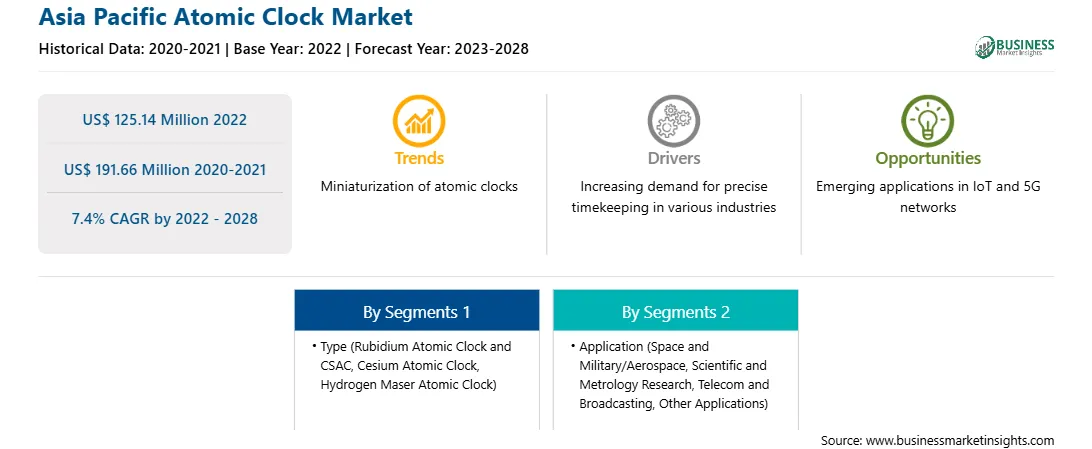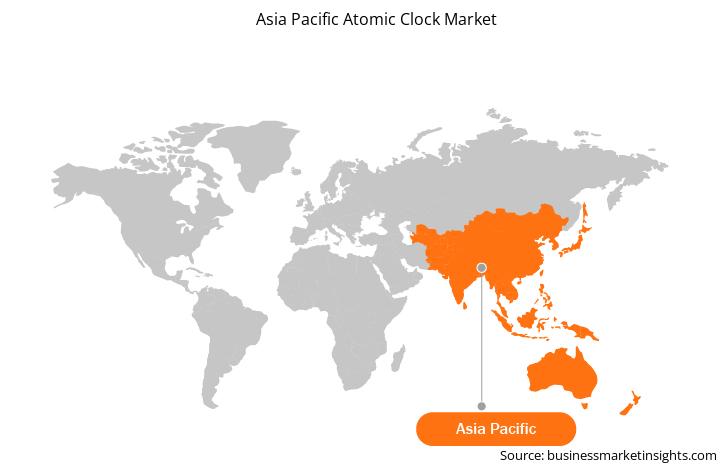The Asia Pacific atomic clock market is expected to grow from US$ 125.14 million in 2022 to US$ 191.66 million by 2028. It is estimated to grow at a CAGR of 7.4% from 2022 to 2028.
Emerging Digital Infrastructure and 5G Base Stations is Expected to Provide Lucrative Opportunities for the Asia Pacific Atomic Clock Market
Network timing is a critical component of wireless network services. Growing advancements in wireless technologies with technology iterations from 2G to 5G have transformed the network timing architectures. 4G base stations can rely on the usual clocks for their split-second time coordination requirements. However, the emergence of 5G has changed the network timing architectures. In October 2022, the Government of India launched the 5G telecom spectrum service in 13 cities, which is anticipated to spread across the rest of the country by 2023. 5G will propel the use of atomic clocks and antennas to follow a phone or sensor with its own beam of data and can distribute networks for different tasks. Regular clocks are not standardized enough to deal with high-speed data movement. As a result, 5G network builders across the world are demanding atomic clocks for precision and accuracy. For instance, in November 2019, Vodafone announced to install an iridium atomic clock in its base stations to provide the correct time to its network if the GPS network goes down. Therefore, the growth in digital infrastructures, especially, 5G base station establishments are anticipated to boost the atomic clocks demand for reliable timing for higher data rates and low latency. All these factors are expected to provide lucrative opportunities for the Asia Pacific atomic clock market.
Asia Pacific Atomic Clock Market Overview
The increasing production of atomic clock is one of the major factors driving the growth of market in Asia Pacific region. In Asia Pacific, China and Japan are the major producers of cesium and hydrogen maser atomic clocks. In addition, the Indian Space Research Organization (ISRO) has developed its own atomic clock ensemble of cesium and hydrogen maser. ISRO has also been working on high-precision atomic clocks based on rubidium. Further, China is one of the most significant revenue contributors to the Asia Pacific atomic clock market in Asia Pacific. China led the Asia Pacific market with a market share of 37.28% in 2021. It declared the BeiDou Navigation Satellite System (BDS) official commissioning in July 2020, marking it formally available for global users. More than 400 agencies and 300,000 research personnel and technicians are involved in the BDS system. The China Academy of Space Technology (CAST), a satellite developer, has brought together leading experts and manufacturers the country and has integrated the most advanced technologies and high-quality materials and products for the project. Rubidium atomic clocks provide BDS satellites with time and frequency standards, and these clocks play vital role in the system's positioning, speed measurement, and timing accuracy. More than 100 rubidium atomic clocks, including 70 high-precision clocks, have been delivered to the BDS program by the Xi'an branch in the last two decades. Further, Asia Pacific is anticipated to register the highest CAGR in the global atomic clock market. The rise in the use of atomic clocks in satellite antennas in the aviation, telecommunications, and broadcasting applications in countries such as India and China are anticipated to boost the region's market growth during the forecast period. In November 2022, the final module of China's Tiangong space station docked with its core structure completing landmark moment in the country's space ambitions. The module carried scientific equipment used to study microgravity and carry out experiments in fluid physics, materials science, combustion science and fundamental physics, along with the world's first space-based cold atomic clock system that will form the most precise time and frequency system in space, not losing one second in hundreds of millions of years. Such developments are anticipated to propel the growth of the Asia Pacific atomic clock market.

Strategic insights for the Asia Pacific Atomic Clock provides data-driven analysis of the industry landscape, including current trends, key players, and regional nuances. These insights offer actionable recommendations, enabling readers to differentiate themselves from competitors by identifying untapped segments or developing unique value propositions. Leveraging data analytics, these insights help industry players anticipate the market shifts, whether investors, manufacturers, or other stakeholders. A future-oriented perspective is essential, helping stakeholders anticipate market shifts and position themselves for long-term success in this dynamic region. Ultimately, effective strategic insights empower readers to make informed decisions that drive profitability and achieve their business objectives within the market.

| Report Attribute | Details |
|---|---|
| Market size in 2022 | US$ 125.14 Million |
| Market Size by 2028 | US$ 191.66 Million |
| Global CAGR (2022 - 2028) | 7.4% |
| Historical Data | 2020-2021 |
| Forecast period | 2023-2028 |
| Segments Covered |
By Type
|
| Regions and Countries Covered | Asia-Pacific
|
| Market leaders and key company profiles |
The geographic scope of the Asia Pacific Atomic Clock refers to the specific areas in which a business operates and competes. Understanding local distinctions, such as diverse consumer preferences (e.g., demand for specific plug types or battery backup durations), varying economic conditions, and regulatory environments, is crucial for tailoring strategies to specific markets. Businesses can expand their reach by identifying underserved areas or adapting their offerings to meet local demands. A clear market focus allows for more effective resource allocation, targeted marketing campaigns, and better positioning against local competitors, ultimately driving growth in those targeted areas.

Asia Pacific Atomic Clock Market Segmentation
The Asia Pacific atomic clock market is segmented into type, application, and country.
Based on type, the Asia Pacific atomic clock market is segmented into rubidium atomic clock and CSAC, cesium atomic clock, and hydrogen maser atomic clock. In 2022, the rubidium atomic clock and CSAC segment registered a largest share in the Asia Pacific atomic clock market.
Based on application, the Asia Pacific atomic clock market is segmented into space and military/aerospace, scientific and metrology research, telecom and broadcasting, and other applications. In 2022, space and military/aerospace segment registered a largest share in the Asia Pacific atomic clock market.
Based on country, the Asia Pacific atomic clock market is segmented into Australia, China, India, Japan, South Korea, and the Rest of Asia Pacific. In 2022, China segment registered a largest share in the Asia Pacific atomic clock market.
AccuBeat Ltd; Excelitas Technologies Corp; IQD Frequency Products Ltd; Leonardo SpA; Microchip Technology Inc; Orolia; Oscilloquartz SA; Stanford Research Systems Inc; and Tekron International Ltd are the leading companies operating in the Asia Pacific atomic clock market.
The Asia Pacific Atomic Clock Market is valued at US$ 125.14 Million in 2022, it is projected to reach US$ 191.66 Million by 2028.
As per our report Asia Pacific Atomic Clock Market, the market size is valued at US$ 125.14 Million in 2022, projecting it to reach US$ 191.66 Million by 2028. This translates to a CAGR of approximately 7.4% during the forecast period.
The Asia Pacific Atomic Clock Market report typically cover these key segments-
The historic period, base year, and forecast period can vary slightly depending on the specific market research report. However, for the Asia Pacific Atomic Clock Market report:
The Asia Pacific Atomic Clock Market is populated by several key players, each contributing to its growth and innovation. Some of the major players include:
The Asia Pacific Atomic Clock Market report is valuable for diverse stakeholders, including:
Essentially, anyone involved in or considering involvement in the Asia Pacific Atomic Clock Market value chain can benefit from the information contained in a comprehensive market report.